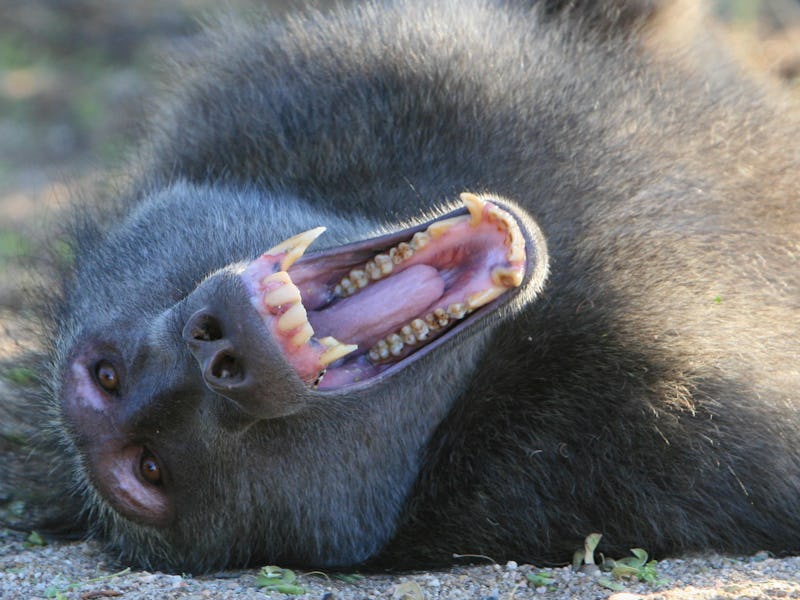The Upsetting Evolutionary Precedent for Jealous Boyfriends
Baboons can be abusive, too.

Abusive relationships may seem uniquely human, but we might share this toxic trait with our primate relatives. It turns out that baboons exhibit behavior that looks startlingly similar to intimate partner violence.
In a study published Thursday in the journal Current Biology, a team of researchers observed a community of wild chacma baboons (Papio ursinus) and found that the males engaged in long-term violent behavior toward females, wielding that power as a form of sexual intimidation and preventing the females from running off with other males.
At first, the researchers didn’t make the connection between violence and sex because previous research had suggested that the two activities didn’t necessarily happen around the same time. “Incidents of male aggression towards females are common in chacma baboons but did not seem to be linked to sexual activity, so far,” Elise Huchard, Ph.D., a behavioral ecologist at Centre d’Ecologie Fonctionnelle et Evolutive in France, tells Inverse. But her most recent study, she explains, defined the link more clearly.
This male chacma baboon is shown attacking a female baboon. Researchers say this is part of a long-term strategy to monopolize the female's mating choices.
Over years of observation, Huchard and her colleagues discovered a pattern to the violence. They found that male aggression toward females was a long-term strategy geared toward limiting females’ mate choices — in other words, an effort to avoid getting cucked in the future. Even though violence didn’t occur directly before or after sex, over time it became clear that the males who were aggressive towards females had much higher rates of mating success when the females were ovulating.
Furthermore, the researchers found that male aggression, which targets fertile females at much higher rates than pregnant or nursing females, represent a significant source of injuries to these female baboons.
Pregnant and lactating female baboons were much less likely to be victims of male aggression than females who were cycling.
These findings build upon research published a decade ago from a team led by University of New Mexico anthropologist Martin Muller, Ph.D. They observed wild chimpanzees (Pan troglodytes schweinfurthii) engaging in abusive behavior, and the consequences were similar to what Huchard found, despite the difference in species: Fertile females were frequently injured, and male aggression seemed to constrain female mate choices.
“When the pioneering work in chimpanzees showing the occurrence of sexual intimidation came out, we thought that we should investigate a potential link between male violence and sex in baboons in order to better understand why males are being violent towards females,” says Huchard.
So her latest research on baboons, coupled with existing studies focusing on chimpanzees, suggests that all primates share in the troubling habit of sexual intimidation. This, in turn, draws strong parallels to sexual intimidation and intimate partner violence in humans. Huchard acknowledges that the evidence is compelling, but she cautions that we must always be careful when drawing these parallels.
“The fact that it occurs in another social primate may suggest that human sexual violence has a long evolutionary history,” she says. “However, it is a possibility, and there are alternative explanations to human sexual intimidation. For example, we know that it varies widely across human cultures and, therefore, has a strong cultural component.” This cultural component could prove to be relevant for chimpanzees, she says, as different chimp societies have shown variations in their degrees of sexual intimidation.
Teasing apart the cultural from the biological will be the researchers’ next steps as they try to figure out what accounts for the variety of relationships in baboon society.
“We observed a lot of variation across male-female pairs, with some violent relationships and some very peaceful ones,” says Huchard. “We want to understand why. Is it due to male or female personality — or to their combination? Is it linked to male social strategies — subordinate males may need to be more violent than alpha males to monopolize females? Can males be violent towards one female and nicer to another?”